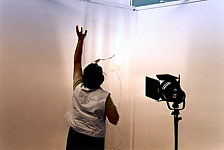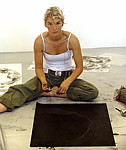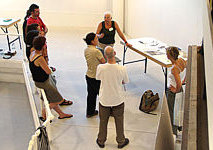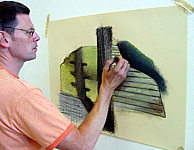Drawing Quarters is an ongoing series of practice-based symposia aimed at artists and practictioners who wish to explore the nature of their practice and its relationship to drawing in all its forms and methodolgies.
Led by four different internationally acclaimed artists for each symposium, each of whom has a particular drawing philosophy, Drawing Quarters is designed to :lol:provide an exciting opportunity for artists to focus on their practice and also to engage with some of the current debates within the sector’s growing drawing community.
Delegates will take part in a selected 'Quarter' workshop and series of talks, and have their ideas and philosophies on the their own personal interpretations as well as the wider view of what constitutes drawing challenged, informed and expanded upon.





Drawing Quarters 'Quarter leaders; thus far have included Professor Paul Gough, Professor Deanna Petherbridge, David Inshaw RWA, Tania Kovats, Grenville Davey, Humphrey Ocean, Esmé Clutterbuck, Caroline Broadhead, Susanna Heron, Avis Newman, Peter Lord, Julian Perry, Roger Conlon, Anne Christopher, Emma Stibbon and Janet Stoyel. Each of these artists has brought their own personal and unique ideas on Drawing to the Symposia series.
For an illustrated overview of the Drawing Quarters series of Symposia undertaken so far, click on the links below.
Drawing Quarters 1 2004 Quarter Leaders: Paul Gough, Grenville Davey, Humphrey Ocean, Caroline Broadhead
Drawing Quarters 2 2005 Quarter Leaders: Deanna Petherbridge, Tania Kovats, Susanna Heron, Avis Newman
Drawing Quarters 3 2006 Quarter Leaders: Peter Lord, Roger Conlon, Anne Christopher and Emma Stibbon
Drawing Quarters 4 2007 Quarter Leaders: Amanda Wood, Peter Randall-Page, talk by Dr Nigel Hurlstone
Drawing Quarters 2008 Quarter Leaders: Esmé Clutterbuck, David Inshaw RWA, Julian Perry, Janet Stoyel
Drawing Quarters 2007 : Evening Lecture : Dr. Nigel Hurlstone
As part of this year’s Drawing Quarters experience the Bristol School of Art, Media and Design have pleasure to confirm that Dr. Nigel Hurlstone gave an evening lecture at the Royal West of England Academy (RWA) on Wednesday 11 July 2007.
Evening Lecture : Synopsis:
This lecture will examine the relationship between Drawing and Embroidery. The notion of ‘embroidery’ is often understood as one of embellishment; usually destined for fashion or interiors use or defined as ‘Textile Art’ as some kind of hybrid Fine Art practice. Defined by its own process, what becomes negated in both the discourse and critique of Embroidery is its fundamental associations with drawing; that of ‘hand marking’ a surface. The pedagogy of Drawing is essentially that of Embroidery. This lecture will explore this hypothesis through an examination of the practice of four practitioners and students. It will attempt to articulate the symbiotic relationship between Embroidery and Drawing and point to the need to re-invigorate this relationship in Art and Design education. It will explore teaching and learning methods that are not afraid to articulate and promote notions of ‘skill’, ‘practice’ and ‘perseverance’ as being central to a contemporary educational philosophy.
Dr. Nigrl Hurlstone : Biography
b. 1970
Nigel Hurlstone initially studied Foundation Art and Design at North Staffordshire Polytechnic before moving to Manchester Metropolitan University where he graduated with first class honours in Embroidery in 1994. He subsequently gained an M.A. in Textiles with distinction in 1996 and was awarded his Ph.D. from M.M.U. in 2000. He was appointed as Lecturer in Embroidery at Glasgow School of Art in the same year, and then moved to the University of the West of England in 2002 to become Programme Leader for a newly established degree course within the Faculty of Art, Media and Design, B.A. (Hons) Drawing and Applied Arts. In 2005 he returned to Manchester Metropolitan University to become Head of Embroidered Textiles. Nigel has taught predominantly on design based degree programmes and has a passion for learning and teaching that is firmly embedded in drawing as a means by which students originate, develop and articulate their ideas.